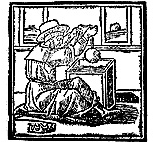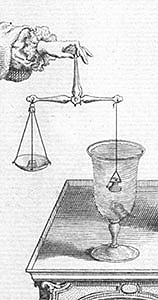![]() Natural Magick
Natural Magick
![]() Medieval Treatise
Medieval Treatise

| Back to . . . | This section . . . |
|
 A Latin treatise on determining the volume or density of an object or liquid entitled “Liber Archimedis de insidentibus in humidum” (“The Book of Archimedes on Floating Bodies”) circulated in the middle ages.
However, it is generally believed that Archimedes did not write it, although his works on hydrostatics clearly underlie it. It possibly dates from the 12th or 13th century.
A Latin treatise on determining the volume or density of an object or liquid entitled “Liber Archimedis de insidentibus in humidum” (“The Book of Archimedes on Floating Bodies”) circulated in the middle ages.
However, it is generally believed that Archimedes did not write it, although his works on hydrostatics clearly underlie it. It possibly dates from the 12th or 13th century.
The treatise begins with fourteen definitions and six postulates, which set the stage for eight propositions. The fourth of the propositions explains how to determine the composition of an object that is an alloy of two metals by weighing the object in air and in water and also weighing quantities of the two metals in air and in water. This proposition thus presents a solution to the Golden Crown problem, although no specific mention is made of the problem in the treatise. Below is an English translation of the relevant proposition together with the original Latin text. | |
|
IV. IN A BODY MIXED FROM TWO KINDS, TO DETERMINE HOW MUCH OF EACH KIND IS IN IT.
If there be given some body mixed from two known kinds of body, and if we wish to know how much of each kind is in it, we will weigh bodies of each kind, separately, in both air and water; and we will take the excesses of the weight of each body in air over its weight in water, and note them separately. Then we will weigh the mixed body in both air and water, and we will note the excess of its weight in air over its weight in water. Then the ratio of the quantity of light body present in the alloy, to the magnitude of the alloy itself, will be as the ratio of the excess weight of the alloy to the excess weight of the lighter body. |
IV. IN CORPORE EX DUOBUS MIXTO, QUANTUM SIT IN EO DE UTROQUE DECLARARE. Si fuerit aliquod corpus ex duobus mixtum, corporibus notis, et velimus scire quantum in eo sit de utroque ipsorum, ponderabimus unumquodque corporum per se, et in aere et in acqua, et sumemus superabundantiam cuiusque corporis quod habet in aere ad illud quod in aqua, et has superabundantias seorsum ponemus. Deinde ponderabimus corpus mixtum, et in aere et in aqua, et sumemus superabundantiam ponderis quod habet in aere ad illud quod in aqua. Erit ergo proportio levis corporis quod in mixto corpore est, ad ipsum mixtum, sicut superabundantia ponderis mixti ad superabundantiam corporis levioris. |
The English translation and Latin text are from:
The Medieval Science of Weights
(Scientia de Ponderibus)
Treatises Ascribed to Euclid, Archimedes, Thabit ibn Qurra, Jordanus de Nemore and Blasius of Parma
Edited with Introductions, English Translations, and Notes by
Ernest A. Moody and Marshall Clagett
Madison, Wisconsin (USA): The University of Wisconsin Press, 1952